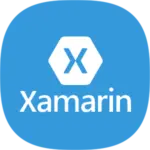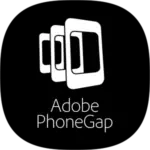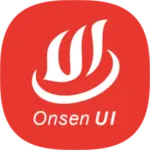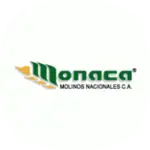The internet has become the best market that there is for businesses. In today’s time, businesses must have their own mobile app if they want to strive against the competition or if they wish to grow and expand.
As per a report, the global market share of mobile was USD 154.05 billion in 2019 and was forecasted to grow at a CAGR of 11.5% annually from 2020 to 2027.
Businesses want to penetrate the market with engaging and effective mobile apps that users can easily use to connect with the business at any time and from anywhere. Moreover, as most people own a smartphone now, users are now more comfortable with using mobile apps for their every need and want.
However, many of us just know how to use apps, and we have no or very little idea of how the apps are developed. The mobile apps are developed using a tool known as the mobile App Development Framework.
Let’s have a look at the 20 best mobile development frameworks in 2025.
Top 20 Mobile App Development Frameworks in 2025
1. Flutter

Flutter is an open-source cross-platform mobile app development framework. It can be used to develop mobile, desktop, and web applications. The Framework works on a single code base, and a single code can be used to develop Android as well as an iOS app. The Framework provides a UI toolkit and various widgets that help in the comfortable and speedy development of the mobile app.
The Flutter framework is developed by Google. It uses a 2D rendering engine called Skia for developing the visuals of the application.
Advantages
- Flexible user interface
- Speedy app development
- Get full native performance
- Offers built-in material design
- Best cross platform app development
2. React Native

React Native is an open-source app development framework. This framework is developed by Facebook. It uses the JavaScript programming language to develop native mobile applications. It is used by giants like Instagram, Tesla, Airbnb, and many fortune 500 companies. One can see the live changes as soon as they save them.
It helps build attractive User Interfaces and is among the most recommended mobile app development frameworks.
Advantages
- Code reusability
- Native like cross platform app development support
- Cost-effective
- Ease of maintenance
- Compatibility with third-party plugins
3. Xamarin Platform

Xamarin is an app development platform that uses uniform UI to develop native applications. It can be used to develop apps for Android, iOS, Windows, and macOS. Around 75% of codes can be shared across various platforms, and therefore the developers get their hands on “write once, run everywhere” ease.
The Framework is packed with almost every required tool and library needed to develop apps that provide a rich UI experience.
Advantages
- Single technological stack.
- Sharable code.
- Cross platform app support
- Technical support by microsoft.
- Time and cost-saving mobile app development.
4. Ionic Framework

Ionic framework is a cross-platform, open-source UI toolkit that can be used to develop high-quality mobile apps using web technologies like HTML, CSS, and JavaScript. It has integrations with popular frameworks like Angular & React Native.
It focuses on front-end UI & UX interaction of apps like Gestures, animations, Interactions, UI controls, etc.
Advantages
- One code for all app stores.
- A performance-focused Framework.
- Clean, Simple, and functional design.
- Availability of Cordova plugins.
5. Adobe PhoneGap

Purchased by Adobe in 2011, PhoneGap is a mobile app development framework that used languages like HTML5, CSS3, and JavaScript for cross-platform app development. The cross-platform development ability allows you to develop the app for a single platform, and then you can use the same code to develop the app for various platforms.
This Framework is a natural choice for developing Hybrid apps.
Advantages
- Reusability of codes.
- Backed by apache, powered by Apache Cordova.
- Easy-to-work plugins.
- Robust backend.
6. Solar2D

Solar2D is a cross-platform, open-source Framework. The Framework is also known as 2D game development Framework. It provides ten times faster development than any other app development framework, thanks to the backend support by Lua – a lightweight programming language that facilitates speed, simplicity, and flexibility.
Solar2D is suitable for building apps for iPhone, iPad, Tablet, Android phone, Mac, Windows, Desktop, Fire TV, etc.
Advantages
- Multiple plugins.
- Faster development.
- Strong API support.
- Cost effective development.
7. Mobile Angular UI

The Mobile Angular UI is a combination of HTML5, Bootstrap, and AngularJS. If a person is familiar with BootStrap and AngularJS, they can learn this mobile app development framework in no time. It contains components like switches, sidebars, overlays, scrollable areas, etc., basically all the components that were missing in the Bootstrap.
It provides a robust and attractive User Interface for effective and accessible mobile app development.
Advantages
- Responsive framework.
- Easier to develop hybrid apps.
- No jQuery dependencies.
- Use CSS files to build a fully responsive UI.
8. Ktor

Ktor is a free, open-source, and cross-platform mobile app development framework. It can be used to develop iOS apps, Android apps, microservices, web applications, and more. It is a suitable framework to develop a hybrid app. Ktor is a light-weight framework that allows you to configure the functionality transparently.
It comes with Kotlin support.
Advantages
- It is a lightweight framework.
- It is small and straightforward, and thus, this boosts the development process.
- Kotlin native helps in developing native apps.
- Allows you to build Asynchronous servers.
9. NativeScript

Backed by Bulgarian software company Telerik, NativeScript is an open-source, cross-platform native mobile app development framework. The apps developed using NativeScript share the same API as Xcode and Android Studio. The official website continuously provides various learning tutorials and resources of the Framework. The Framework is empowered with Angular, TypeScript, JavaScript, CSS, and Vue.js.
NativeScript is well suited to develop apps for multiple platforms within an effective budget and in less time.
Advantages
- Native User Interface.
- Direct access to iOS and android APIs.
- Strong backend support.
- Reusability of codes.
10. jQuery Mobile

jQuery Mobile is an HTML5 based open source and cross-platform app development framework. With the mantra, “write less, do more”, jQuery mobile allows you to write a single code for a web or mobile app, and then you can use the same across all the other platforms.
The ThemeRoller features allow you to drag and drop colors and to download the custom theme so that you can create the perfect UI based on your brand.
Advantages
- Easy to learn if you know the basics of HTML5 and CSS3.
- It is a cross-platform and cross-browser-compatible Framework.
- ThemeRoller allows you to create custom themes.
- Reusability of the codes.
11. Appcelerator Titanium

Appcelerator Titanium (Axway Appcelerator) is a cross-platform, open-source native framework that uses JavaScript, CSS, and HTML. As the name suggests, Appcelerator is an accelerator for your app development process. It ranks among the most used cross-platform mobile app development frameworks with over 35,000 apps developed.
The growing community of the Appcelerator Titanium comes pretty handily whenever you are stuck or when you wish to explore something new.
Advantages
- It allows rapid prototyping and is flexible.
- Easy to learn and develop apps.
- The code module helps in boosting the speed of development.
- Growing community comes in handy.
12. Framework7

Framework7 is a free, open-source, cross-platform mobile app development framework that uses CSS, HTML, and some basic JavaScript. It allows the developers to develop Hybrid apps for various platforms. Framework7 has easy and similar jQuery syntax that helps in getting started without any delay.
It has a built-in grid system layout that facilitates the arrangement of the elements responsively.
Advantages
- The learning curve of Framework7 is super easy.
- It has various pre-styled widgets & components.
- Various libraries act as in-built helpers.
- It supports faster development via Bower.
13. Sencha Ext JS

Sencha Ext JS is an open-source, cross-platform, comprehensive JavaScript mobile app development framework. With the latest version of Sencha Ext JS, it combines the power of Ext JS and Sencha Touch; the developers can quickly develop Hybrid apps that support the latest browsers and platforms.
Apps can be developed for different platforms using a single code.
Advantages
- You get your hands on customizable UI widgets.
- The flexible layout manager helps to organize the display of data and content.
- Reduces the cost of app development.
- The codes are highly readable as it uses MVC Architecture.
14. Oracle Mobile Application

Oracle Mobile Application Framework (Oracle MAF) is a hybrid mobile app development framework that allows developers to develop single-source mobile applications rapidly. These applications can then be deployed across other platforms like iOS, Android, Web, Windows, etc. It used Java, HTML5, and JavaScript. It maximizes the reusability of the codes and therefore helps in faster mobile app development.
Oracle Mobile provides a visual development experience.
Advantages
- Enables you to develop richer user interfaces by leveraging over 80 components.
- Easily access native mobile services like SMS, phone, camera, GPS, and more.
- Allows you to integrate an on-demand and browser-based mobile interface in the same application.
- End-to-end encryption will enable you to develop secure apps.
15. Onsen UI 2

Onsen UI 2 is an open-source, cross-platform framework that allows developers to develop web and hybrid apps. It streamlines the development process with zero time setup and uses JavaScript, HTML, and CSS. Onsen UI 2 is effortless to learn, and in a short while, the developer can start developing complex apps using Oracle Mobile Application Framework.
It uses Angular in such a way that you can do the development process without knowing anything about Angular.
Advantages
- Ready to use components for auto-styling the apps.
- Performance optimized for mobile.
- Theme Editor helps in developing fantastic UI.
- It offers powerful command-line tools.
16. Monaca

Monaca is an open-source, cross-platform, hybrid mobile app development platform. It can be used to develop HTML5 hybrid mobile apps. It is the most open and ready framework that you can easily plug into your existing workflow or development environment.
Monaca provides four different environments to increase flexibility and convenience during app development.
Advantages
- Cloud-empowered development.
- Framework Agnostic.
- Mix and match the theme and UI.
- Powerful debugging and testing.
17. Quasar

Quasar is a UI Framework that is used to provide the Vue users with reusable, styled components, as Vue lacks them. Mainly, it is a Material Design 2, full front-end stack for Vue.js. It is a high-performance and powerful platform, yet simple. It uses the MIT-licensed UI kit and also, comes with a lot of UI components.
Advantages
- Effective documentation.
- Material design components.
- Integrated Vue plugins.
- Stylus variations.
18. Aurelia

Aurelia is a modern, cross-platform, open-source, front-end JavaScript Framework which use to develop web, mobile, and desktop applications. Although JavaScript is the most favored programming language, it can be slow, and to overcome this factor, Aurelia is the best JavaScript Framework to do so.
Aurelia uses languages like JavaScript, ES6, Typescript, old JavaScript code, CoffeeScript, etc.
Advantages
- Aurelia has no dependencies.
- It used simple conventions to boost the app development process.
- It is compliant with new standards.
- Easy to learn.
19. BeeWare

BeeWare is an open-source, cross-platform mobile app development framework that works on the Python language. It is a very easy framework to work on as a beginner, and as much a strong tool in the hands of an expert. The apps developed using the framework can perform natively on any platform that you release the app on.
The tools that BeeWare offers help the developers to write Python codes with a rich and unique interface and the libraries help them in upgrading the app to its full.
Advantages
- BeeWare uses native widgets and native functionality in contrast to the theme-based approach.
- The tools and the libraries are rich to develop effective cross-platform apps.
- It is an easy framework for beginners to start with.
- BeeWare provides the users with libraries to access the native capabilities of the device.
20. Kivy

Kivy is a cross-platform, open-source, mobile app development that uses Python library to rapidly develop applications that offer unique user-interface like multi-touch apps. It is a 100% free-to-use tool. The toolkit of the framework is professionally developed, backed, and used. Given the extensively rich library, the tool is extremely powerful.
The multitouch support allows the developers to develop various graphically rich widgets for the app.
Advantages
- As the framework is based on Python, it is an extremely powerful tool to develop natively performing apps.
- The developer just has to write the code once, and then they can use it across all the platforms.
- The multi-touch support makes it easy to build widgets.
- The framework performs better than HTML5 cross-platform alternatives.
App Development Framework FAQs
Have questions regarding the app development framework? Here, we have answered of most frequently asked questions about app development frameworks. Let us know in the comment if we missed out on any.
1. What is Mobile App Development?
Mobile app development is a set of processes to develop installable software, especially for smartphones & mobile devices.
Mobile App Development Framework is a software/tool that is used to develop mobile applications. It is a software library that acts as the required structure to support the development of mobile applications.
It divides into three types of mobile app development categories.
1. Native Mobile App Development
The Native app is an application that is developed for a specific operating system such as the iOS operating system or Android Operating system. If you want to create a native android app then you need to use Android Studio or Kotlin. Likewise, for an iOS app, you need to use Xcode 12 or swift language.
2. Progressive Web App Development
A progressive web app is developed to deliver web pages across various devices. It is a kind of web app that works as a mobile app on mobile devices. It doesn’t require installation. A progressive web app requires a web browser to run an app. Web technologies like CSS3, HTML5, JavaScript, and Ruby are used to develop progressive web applications.
3. Cross-platform App Development
Cross-platform mobile apps are applications that work on multiple mobile platforms with the same programming code. It is suitable for more than one OS like Android, iOS, and more. Frameworks like Xamarin, React Native, Kotlin, and more platforms can be used to develop Cross-platform mobile applications.
2. Which framework is the most effective to choose for native iOS app development?
Swift is the most effective framework for Native iOS mobile app development.
3. Which framework is the most effective to choose for native android app development?
For Native Android Mobile App Development, Kotlin is the most effective framework.
4. Which framework is best to choose for cross-platform app development?
For cross-platform app development, you can choose Flutter or React Native frameworks.
5. Which framework is the most effective to choose for hybrid app development?
For Hybrid App Development, Ionic, Monaca, and Phonegap are the most suitable.
Capermint – The Best Mobile App Development Company
Looking for mobile app development? To get the best result, you should hire a leading app development company to get the best app for your brand/business. Capermint is the best mobile app development company in Canada & USA. With expert developers and an extraordinary team, they will be able to develop the best possible app for you in a budget-friendly and effective manner.
Conclusion
This concludes the list of the Top 20 Mobile App Development Frameworks to look at in 2025. Choose the right Framework based on its benefits and advantages, and get your app development started now! If you wish to know more, you can contact Capermint, and we will be happy to solve all your queries.


